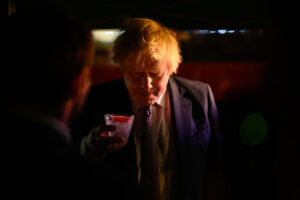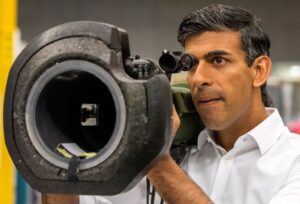There was one clear winner in last night’s prime ministerial debate on ITV. It was, of course, the moderator. While Kier Starmer droned and Rishi Sunak piped and yapped, Julie Etchingham radiated a sincerity that neither of the men on stage with her was able to rival. They were loathing every minute of it and pretending to relish the cut and thrust. She made no pretence. She was bored, she was tetchy, and she absolutely wasn’t having their bullshit.
“Please, gentlemen, we will lower our voices,” she said at one point like a primary school teacher enjoining a rabble of five-year-olds to “use our indoor voices”. Again and again, she interrupted the babble of one or other to insist they answered the question asked, or shut up and give the other one the chance to speak. “Gentlemen, please!”
Not that her interventions were always, or even often, successful. Noting that the IFS thought that both men were in a “conspiracy of silence” about having to either raise taxes or cut services, she asked something to the effect of “are you levelling with us about the public finances — one-word answer, yes or no”. And, of course, both men embarked on long dreary meaningless sentences neither of which contained the word yes, or no.
There was a nice bit around then — it’s a format that could be developed in the second debate — when she made them stop answering out loud altogether. Raise your hand if I’m wrong, she said, and reeled off a list of the unpopular taxes that they both absolutely definitely scout’s honour weren’t going to raise. Both men kept their hands clamped to their sides and hoped their noses weren’t visibly lengthening. Then she asked how they were proposing to pay for everything and, alas, they went back to talking.
This was a wretched, wretched debate — in both its format and in its performers. Who was its intended audience, given it was neither informative nor entertaining? The quickfire format — 45 seconds an answer — meant, even before you factored in the endless interruptions, that nothing remotely substantial stood a chance of being said. Which left rhetorical dash, style and personality: something neither of these earnest technocrats could summon if their political careers depended on it. Sir Keir comes across like the teacher that nobody else in the staffroom wants to include in after-work drinks; and Rishi comes across like the sixth-former who should by rights be head boy but missed out because the teachers found him too annoying.
Of the two men, the debate marginally favoured Sir Keir — if only because he was on easier ground politically, not having been involved in causing the omnishambles the next PM will have to try to clear up. Rishi suffered groans and derisive laughter from the audience a bit more often — blaming Covid and industrial action for the state of the NHS; muttering weakly that the record number of small boats landing was “because it’s a challenge”, and scoring the biggest laugh of the evening when he told a Gen Z that national service was going to be “transformational”.
But stylistically, they were much of a muchness — and it wasn’t a muchness to write home about. Both did the thing of infallibly answering their questioners by name because a manual somewhere says it helps you sound like a human being: “Well, Claire”; “Well, Stephen”, “Like you, Myles, I think…” Both fell over themselves to burnish their ethos appeals with reference to their families. Climate crisis? It’s all Rishi’s girls ever talk to him about so, y’know, he cares. NHS? And did Sir Keir mention that his dad was a humble toolmaker and that he, too, knew what it was like to have your phone cut off because you’d failed to pay the bill?
Watching Sunak, you could see the stiff and nervous result of hours of intensive debate prep from the Tory party’s rhetorical turd-polishing department. Having determined that their candidate was hard to relate to, struggled with spontaneity, and couldn’t help looking slappably smug, they did the best they could to drill him. He had been told to look down the camera, and repeat a small handful of phrases and lines in the hopes that they stuck in people’s heads after the sight of his ghastly comportment at the podium had, hopefully, faded.
Someone, at the very beginning of this campaign, decided that the two phrases he needs to get across to the electorate are “clear plan” and “bold action”. Work them in as often as you can, Rishi. And so he did. Those were the lines he repeated in that bizarre, soggy speech outside Downing Street that fired the starting gun for the election. And those were the lines he repeated every chance he got in the debate.
Cost of living crisis? Why, the Conservatives had “bold action” for that. And, what’s more, a “clear plan”. Immigration? “Bold action” was very much the thing. Oh, and “sticking to our plan”. On foreign policy? I’ve made a “bold” decision. Young people? Making you do national service is “an example of the bold action I’m prepared to take”.
How is running a country like running a football team (another point in Etchingham’s favour is that though she was clearly ordered to ask this “tongue in cheek” question at the end, she didn’t conceal her contempt for its idiocy)? You need, wait for it, “A clear plan and bold action.”
He had been given two other lines of attack and one of defence. The line of defence was, simply, that the last 14 years had been nothing to do with him, and that “this election is about the future”. As you’d imagine, Sir Keir made a certain amount of hay with this because, well, why wouldn’t you?
The attack lines were that Sir Keir was proposing what he variously called “Keir Starmer’s pension tax” and “Keir Starmer’s retirement tax” (they should have settled on one epithet in debate training) because they wouldn’t sign up to his triple-lock-double-plus-ultra or whatever their offer to their core vote is. “For the first time in the history of this country, pensioners will pay tax… Why do you want to do that to pensioners?” he asked in his best Leave-Britney-Alone voice.
But the main one was his claim that every working family would be £2,000 poorer under Labour. My goodness he said that a lot; even more than he said, “bold action”. And to be fair, it did get under Sir Keir’s skin. He tried, with some indignation, to rebut it — even going so far as to deny it in answer to a question about something completely different — but it’s a fool’s game to try to unpick a shonky financial statistic in 45 seconds and Rishi knows it.
Sir Keir, too, had been drilled. He uttered variations on the phrase “turning the page” and “fourteen years” every chance he got. But he did manage moments of genuine, or genuine-seeming, indignation. “Shocking… shocking…” he muttered, really seeming to be shocked as Mr Sunak claimed that the Tories could be trusted on national defence and that Labour couldn’t.
It seemed an odd thing to be the one to really get ventilated about — until you realised that he had momentarily mistaken himself for John McClane in Die Hard, so was taking this personally. He was Director of Public Prosecutions, he said indignantly, when they’d taken down seven aeroplanes that were about to be blown up (and where was Rishi then, eh? Betting against the country in his bank!). He’d been DPP, too, when they’d smashed criminal terrorist gangs — so people smugglers wouldn’t be much of a challenge.
The way he spoke about it, you’d think the DPP was the tip of the spear, personally kicking in doors and wrestling the controls of jetliners from jihadists rather than, say, organising the paperwork for their court appearances in an air-conditioned office in Petty France.
If he turns up for the final debate in an oil-stained vest and sees the PM off with the words “Yippee-ki-ay, motherfucker”, it will be a very welcome development. But the real pop-cultural parallel here is the Spiderman-pointing-at-Spiderman meme. We’re presented with a choice between two men who have rather more in common than divides them.
The infantile politics of the day, and the infantile format of the debate, means that they can talk about “tough decisions” but they can’t talk about tough decisions. Neither of them can admit that one way or another they’ll have to spend less, or tax more, than anyone wants to hear — and that they will both be at the mercy of events rather than otherwise. The rest is showbiz.
Disclaimer
Some of the posts we share are controversial and we do not necessarily agree with them in the whole extend. Sometimes we agree with the content or part of it but we do not agree with the narration or language. Nevertheless we find them somehow interesting, valuable and/or informative or we share them, because we strongly believe in freedom of speech, free press and journalism. We strongly encourage you to have a critical approach to all the content, do your own research and analysis to build your own opinion.
We would be glad to have your feedback.
Source: UnHerd Read the original article here: https://unherd.com/



